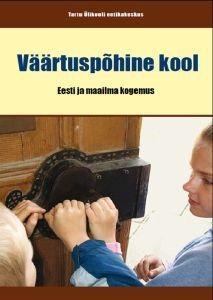Values-based School. Practices in Estonia and in the World

Compiler: Margit Sutrop
Editors: Gea Kangilaski, Mari-Liisa Parder, Triin Pisuke-Roos
Language editor: Elo Kuuste
Design: Merle Moorlat
Eesti Keele Sihtasutus 2013
Language: Estonian
The book was published in the course of the national values programme „Values Development of the Estonian Society 2009–2013“
The focus of the book is on the assessment of pupils and schools. In order to achieve the kind of learning and teaching atmosphere that takes into account the individuality of every child and supports the development of every school member, it is necessary to change the current assessment policy. The articles published in this book help to understand how to support the development and cooperation through a different kind of assessment – the formative assessment of pupils and schools.
The book introduces the activities of the Centre for Ethics that have been carried out in 2009–2013, during the period when the Centre brought into life the national values programme. In the course of the programme, special attention has been drawn to the purposes of education. The curricula of primary and secondary schools have been completed with additional parts that emphasise the importance of values education. The Centre has contributed to the renewal of teacher training programmes and it has trained 25 values education instructors who are able to counsel schools in the questions of values education. Within the five years, several methodological materials have been published and the Centre has initiated the process of creating the model of good schools – the assessment model that aims to support the development of schools, motivate schools to become better and broaden the meaning of a good school.
The book contains the presentations held at the annual values education conferences (the Centre for Ethics has the annual tradition to organise values education conferences where hundreds of head-teachers, teachers, officials and education professors discuss the ways how to improve Estonian schools), articles that introduce the good practices of different countries, articles about the assessment of schools and pupils, an article about the innovations in teacher training etc.
The book has seven parts. The first part introduces the experience of different countries in the development of values-based schools. The practices of Finland, the United States, Australia, Denmark and England are introduced. The second part concentrates on the assessment of pupils in a values-based school and the third part on the assessment of schools, leadership and quality. The fourth part of the book discusses the roles of teachers, head-teachers and youth workers as value educators, and the fifth part gives advice on how to create a good school culture in your school. The sixth part gives an overview of the study materials that are in the service of values education (i.e., it includes an article which analyses values presented in the alphabet book). The seventh part includes a list of the schools and kindergartens who have been recognised at the values education competitions that the Centre for Ethics organises once a year, and a list of the books that have been published in the course of the values programme.
A DVD belongs to the book. The DVD contains videos about the practices of these schools and kindergartens who have won the values education competitions.
The authors of the articles are: Margit Sutrop, Jaana Vasama, Merle Schwartz, Lorraine Ling, Ove Korsgaard, Ruth Cigman, Maria Jürimäe, Viive-Riina Ruus, Louise Hayward, Ernest Spencer, Gordon Oerskov Madsen, Halliki Harro-Loit, Nelli Jung, Ian Durrant, Linda Leith, Lotte Rahbek Schou, Inger Kraav, Lemme Randma, Eve Eisenschmidt, Margus Pedaste, Pille Villems, Raili Allas, Piret Pungas-Kohv, Hedi-Liis Toome, Arno Kaseniit, Ulla Preeden, Tiia Lister, Merit Lage, Loone Ots, Liina Hirv, Laura Lilles-Heinsar, Jaan Mikk


